When managing diabetes, what we eat and when we eat can have significant effects on blood glucose levels.
Nighttime snacking often poses a challenge for diabetic individuals. Choosing the right snacks before bedtime can help maintain stable blood sugar levels throughout the night. This prevents both high and low blood glucose values that can be particularly concerning or dangerous.

Introducing Sugar Defender, an advanced blend of 24 proven ingredients that support healthy glucose levels and natural weight loss.
It’s important for individuals with diabetes to choose snacks that offer a balance of healthy fats, proteins, and complex carbohydrates.
This balance is crucial because foods rich in fiber, protein, and fat digest at a slower pace. As a result, they help to provide a steady release of energy and thus, may help to keep blood sugar levels stable.
Understanding which snacks to choose and the appropriate portion sizes can empower those with diabetes to enjoy a satisfying nighttime treat without adversely affecting their health.
Key Takeaways
- Nighttime snacks for individuals with diabetes should stabilize blood sugar levels.
- A balance of healthy fats, proteins, and complex carbohydrates is essential for optimal snacking.
- Portion control and understanding individual responses to foods are crucial for managing diabetes.
Diabetes and Its Relationship with Diet
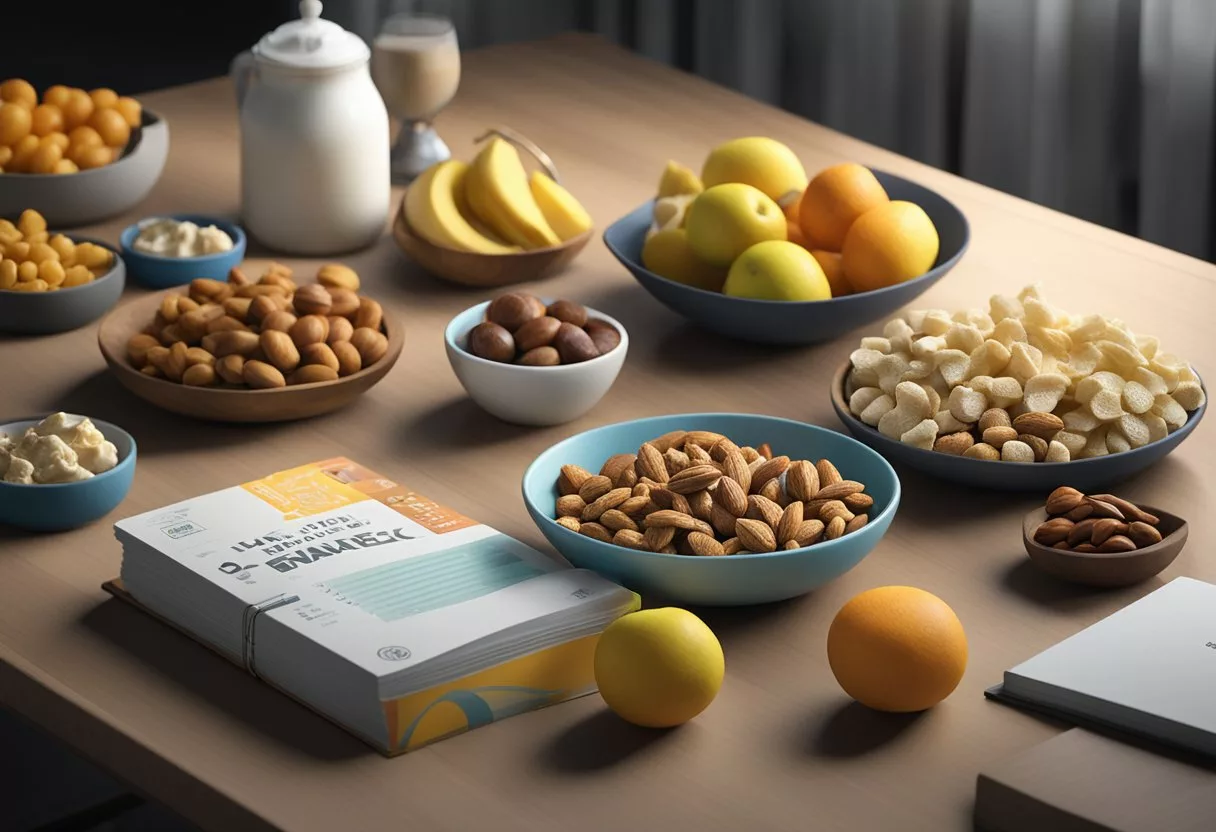
Managing diabetes effectively involves understanding the crucial relationship between diet and blood sugar control.
What individuals with diabetes eat has a direct impact on their blood glucose levels and overall health.
The Role of Blood Sugar Control in Diabetes
Poor blood sugar control can lead to complications for individuals with diabetes.
Blood sugar, or glucose, is an essential source of energy for the body’s cells. In diabetes, the body’s ability to process glucose is impaired.
In diabetes, the body’s ability to process glucose is impaired. Insulin, a hormone produced by the pancreas, is vital for transporting glucose from the bloodstream into the cells.
In type 1 diabetes, the body doesn’t produce insulin. Meanwhile, in type 2 diabetes and gestational diabetes, the cells become resistant to insulin’s effects.
Importance of Nutrition in Diabetes Management
Nutrition plays a pivotal role in managing diabetes. A balanced diet can help maintain optimal blood sugar levels, moderate weight, and reduce the risk of diabetes-related complications.
Individuals with diabetes are advised to focus on:
- Consistent carbohydrate intake: Carbohydrates have the most immediate effect on blood glucose levels. It’s crucial to spread carbohydrate intake evenly throughout the day.
- Fiber-rich foods: Whole grains, legumes, vegetables, and fruits can aid in blood sugar control.
- Healthy fats and proteins: These nutrients have minimal impact on blood sugar and can help sustain energy.
- Monitoring portion sizes: Keeping track of food intake helps prevent spikes in glucose levels.
Healthy Fats and Proteins for Blood Sugar Stability
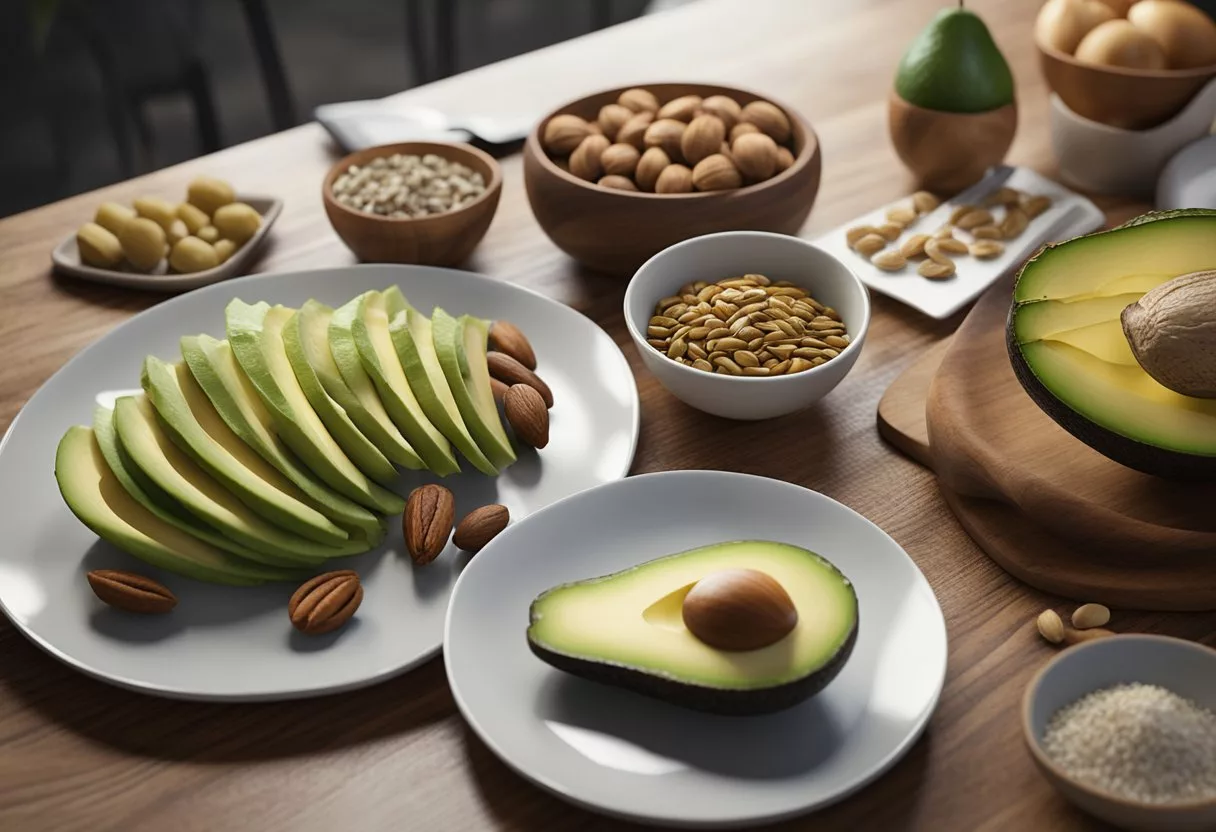
Including healthy fats and proteins in a bedtime snack can contribute to maintaining stable blood sugar levels throughout the night.
Benefits of Consuming Healthy Fats
Healthy fats, particularly those rich in omega-3 fatty acids, can help to slow the absorption of carbohydrates into the bloodstream. This results in a more gradual rise in blood sugar levels.
Foods like almonds and nuts are excellent sources of these fats. For example, a serving of almonds not only offers a good amount of healthy fats but also protein, contributing to blood sugar control.
High-Protein Bedtime Snack Options
High-protein snacks are beneficial for people with diabetes as they can help keep blood sugar levels stable overnight.
Proteins take longer to digest, which means they do not cause rapid spikes in glucose levels. Some effective high-protein snack options include:
- Nut Butter: A spoonful of peanut butter or other nut butters can be both satisfying and beneficial for blood sugar management.
- Cheese: Low-fat cheese paired with whole grain crackers offers a balance of protein and fiber.
- Greek Yogurt: Opt for plain Greek yogurt to avoid excess sugar, and consider adding a portion of berries for additional fiber.
- Cottage Cheese: This is a versatile high-protein option that can also be combined with fruits or vegetables.
- Eggs: A staple for protein, eggs can be prepared in advance and eaten as a snack before bed.
Choosing the Right Carbohydrates
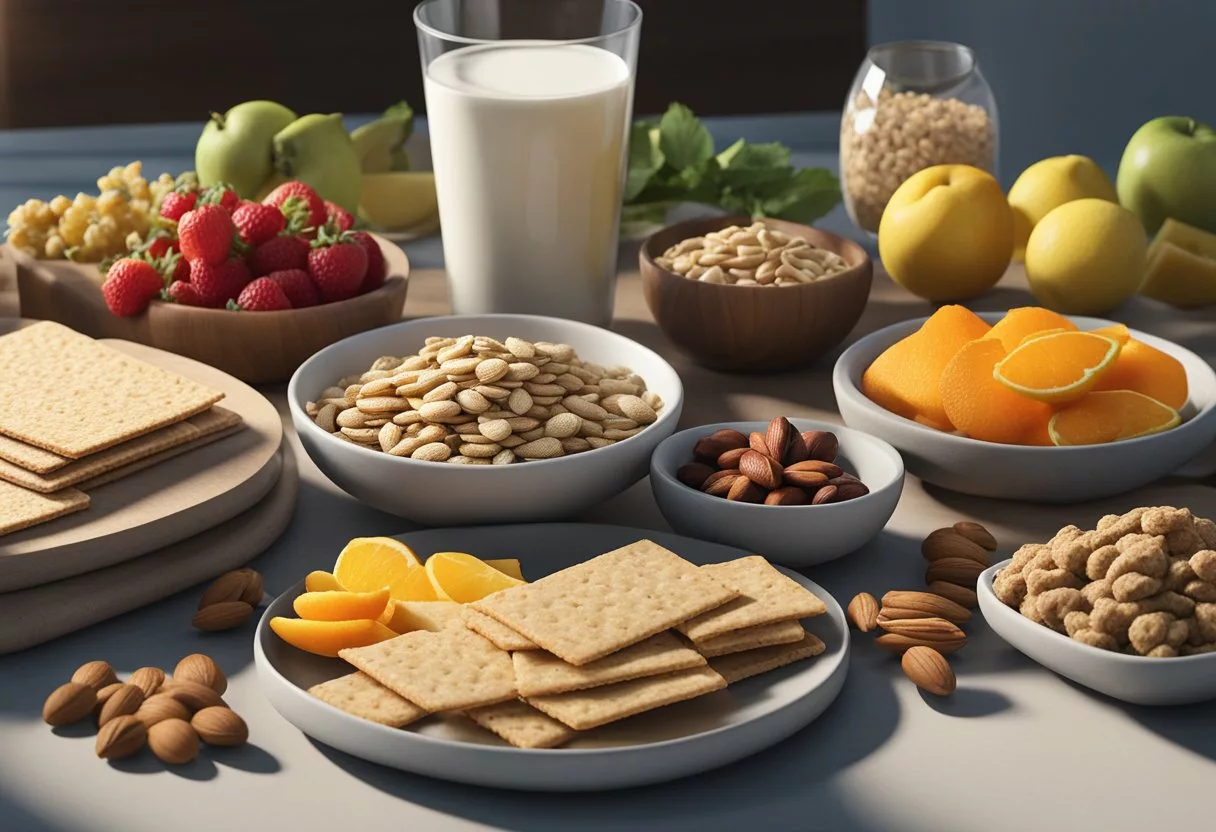
For individuals with diabetes, selecting the right type of carbohydrates at night is crucial for maintaining stable blood sugar levels. The focus should be on carbohydrates that have a low glycemic index and are rich in fiber.
Low Glycemic Index Carbs for Better Control
Carbohydrates with a low glycemic index (GI) are digested more slowly, prompting a gradual rise in blood sugar. This can be particularly beneficial before bedtime.
Whole-grain crackers are an excellent example of low glycemic, complex carbohydrates that can be a part of a diabetes-friendly evening snack. They provide the body with sustained energy and help in maintaining blood sugar control throughout the night.
Fiber-Rich Carbohydrates to Aid Digestion
Dietary fiber is integral in the diabetic diet as it aids digestion and contributes to prolonged feelings of fullness.
High-fiber carbohydrates, like certain vegetables and seeds, can optimize blood sugar levels.
Including chia seeds, which are high in both fiber and essential nutrients, as part of an evening snack may help in the goal of achieving better blood sugar control. Consuming snacks rich in fiber ensures good digestion and helps in managing diabetes.
Snack Selection and Portion Sizes
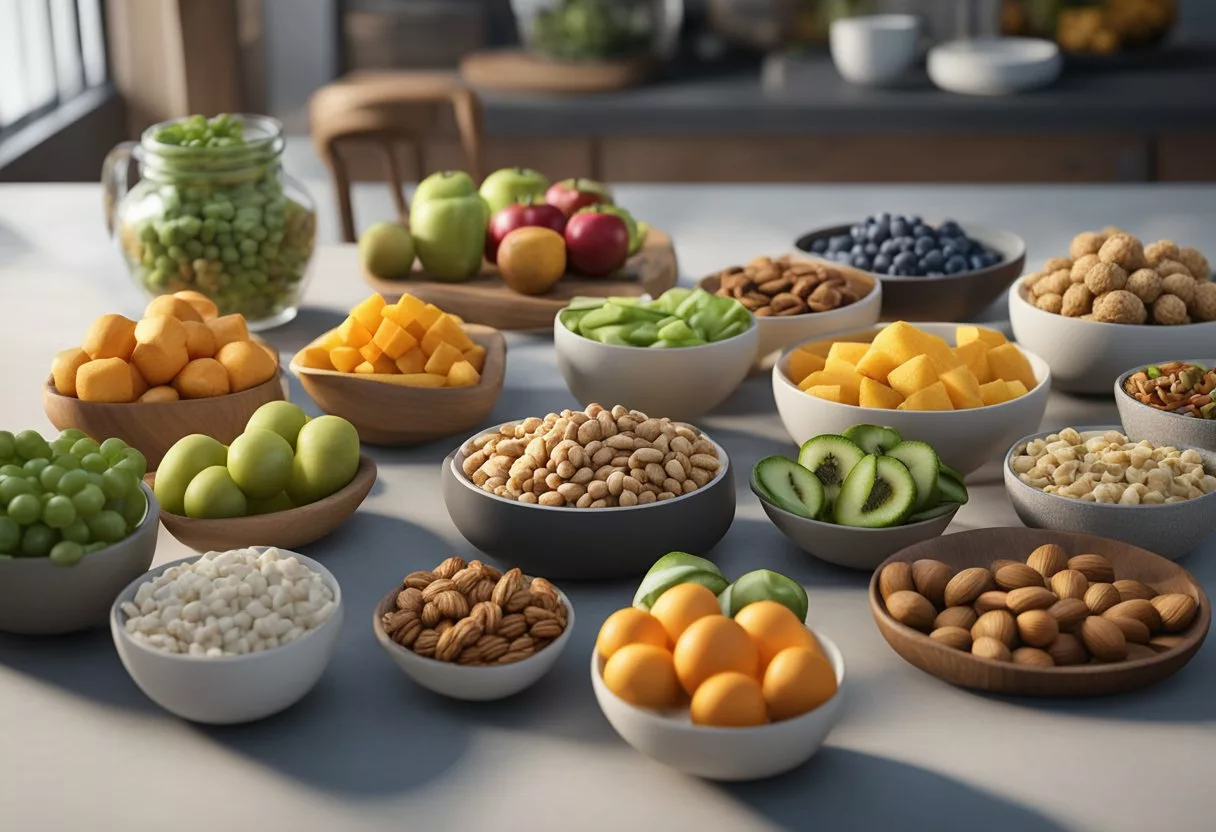
When choosing nighttime snacks, individuals with diabetes should focus on calorie control and appropriate portion sizes to manage blood sugar levels effectively and avoid unnecessary weight gain.
Calorie Considerations for Nighttime Snacks
Nighttime snacks for diabetes should ideally be low-calorie and nutritionally balanced to prevent spikes in blood sugar levels.
It’s important to choose snacks that provide a sense of satiety without an excess of calories.
One example is choosing energy bites that are rich in protein and fiber while being moderate in carbohydrates. By doing so, individuals can satisfy their appetite with a smaller amount of food and calories, aiding in overall calorie intake management.
Benefits of Controlled Portion Sizes
Controlling portion sizes is crucial for managing diabetes, as it directly impacts blood sugar control and weight management.
Consistent, controlled portions allow for predictable blood sugar levels and can reduce the risk of overeating.
For instance, a bedtime snack that is portion-controlled can provide enough energy to sustain through the night without resulting in high blood sugar levels.
Opting for low-calorie snacks in appropriate portions also helps maintain energy balance and supports weight management efforts.
Snack Ideas and Recipes for Diabetes
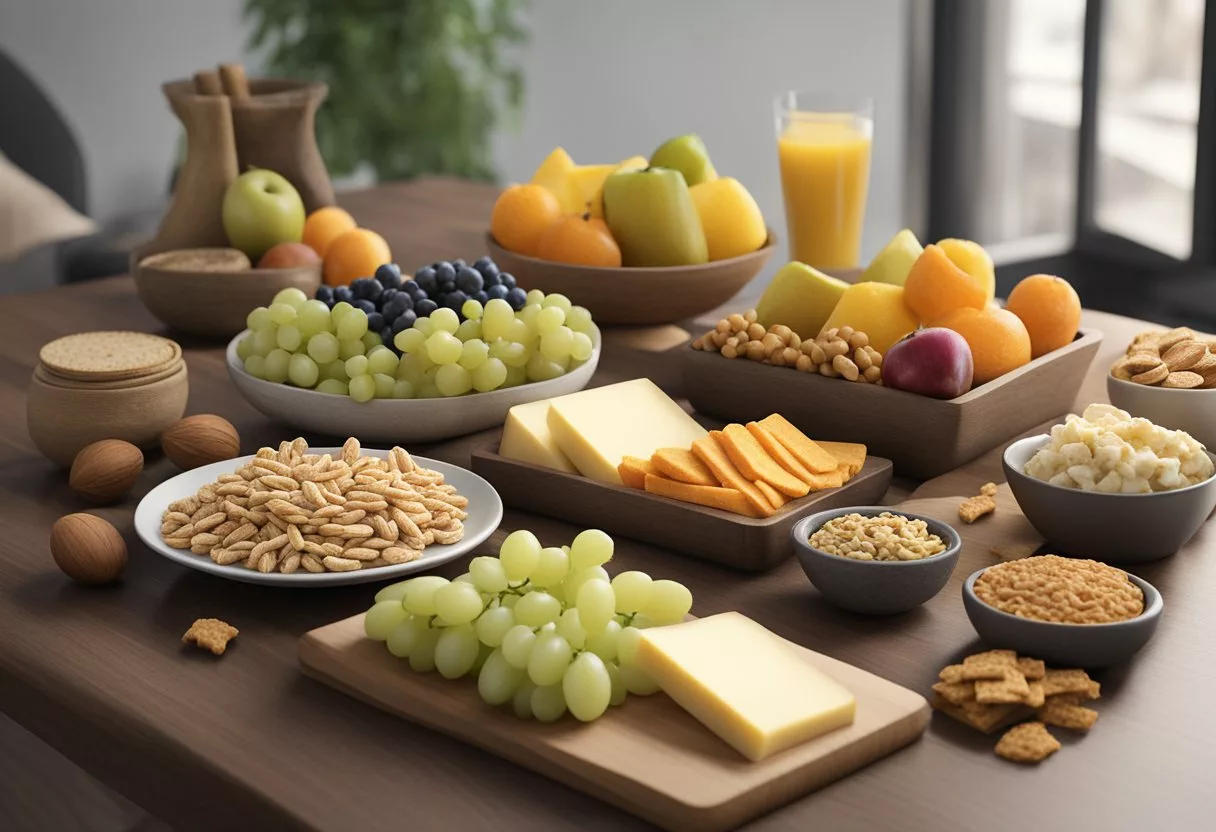
Managing blood sugar levels does not mean one has to sacrifice enjoying snacks.
Carefully selected bedtime snacks can contribute to a stable blood sugar level throughout the night and provide a satisfying end to the day.
Savory Snack Recipes
Roasted Chickpeas: A crunchy and satisfying option, roasted chickpeas offer a good balance of protein and fiber. They are simple to make at home. Just rinse, dry, season, and roast chickpeas in the oven until golden and crispy.
Ingredients:
- 1 can chickpeas
- 1 tablespoon olive oil
- Seasoning of choice (e.g., garlic powder, paprika)
Instructions:
- Preheat oven to 400°F (200°C).
- Rinse and dry chickpeas thoroughly.
- Toss them with olive oil and seasoning.
- Spread on a baking sheet and roast for 25–30 minutes.
For a vegetable-based snack, Hummus with Sliced Veggies — such as carrots, cucumbers, or bell peppers — can be both refreshing and filling. Hummus is made from chickpeas, tahini, olive oil, lemon juice, and spices, making it rich in protein and a good source of healthy fats.
Avocado Toast: Rich in monounsaturated fats, avocado spread on whole-grain toast provides nourishment and a steady energy release. For added flavor and health benefits, top it with some feta cheese and a pinch of sea salt.
Sweet Snack Alternatives
Dark Chocolate: In moderate amounts, dark chocolate with at least 70% cocoa can be a soothing bedtime snack. It’s lower in sugars compared to milk chocolate and contains antioxidants.
Berries and Cream: Berries such as blueberries, strawberries, or raspberries are low in sugar and high in fiber. Pair them with a dollop of Greek yogurt for a creamy treat.
Apple with Peanut Butter: A sliced apple with a tablespoon of natural peanut butter makes for a crunchy and slightly sweet snack, providing both fiber and protein to help regulate blood sugar levels during the night.
For those who prefer something light, Air-popped Popcorn is a whole-grain, fiber-rich snack that can be enjoyed in moderation. It’s low in calories, especially when made without added butter or sugar.
Monitoring and Adjusting to Blood Sugar Responses
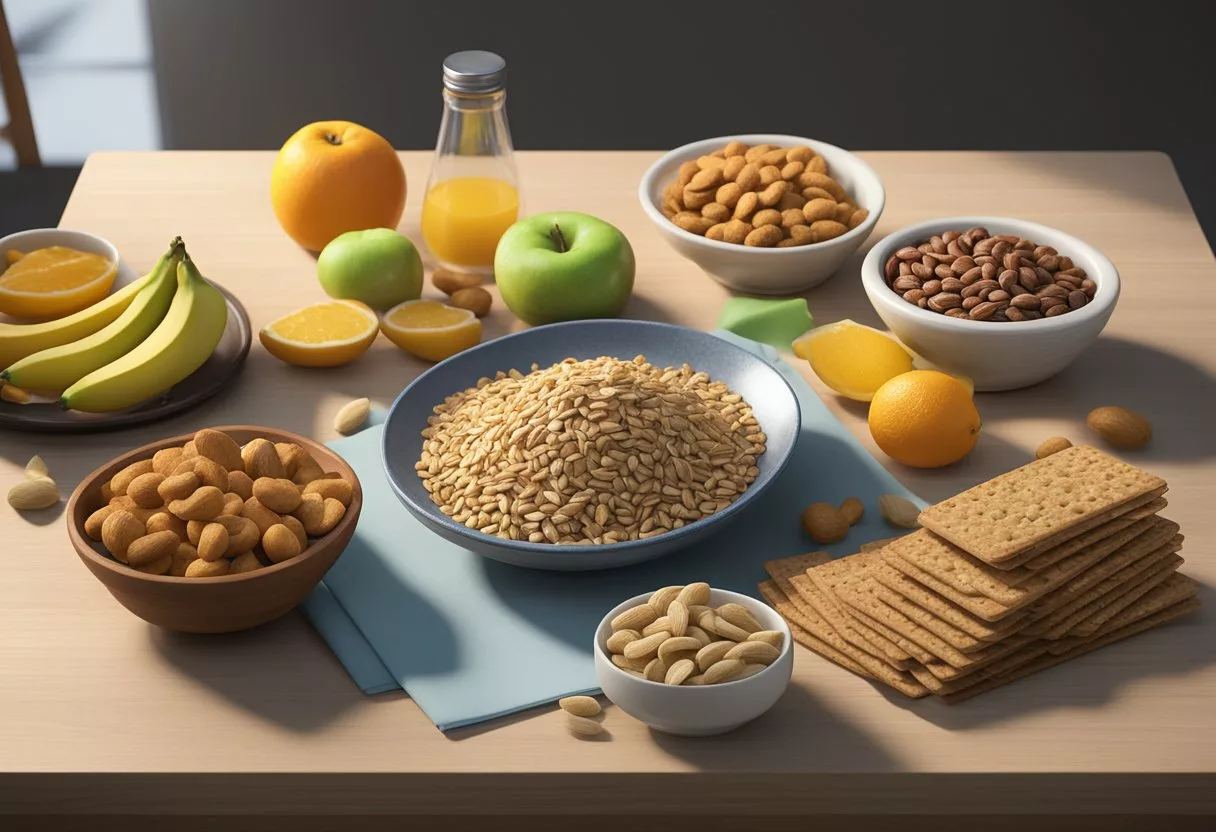
Effective management of diabetes requires an understanding of how blood sugar levels change overnight. Notably, individuals must be mindful of the dawn phenomenon and the risks of nighttime hypoglycemia and hyperglycemia. Regular monitoring can help avoid complications and maintain stable blood sugar levels throughout the night and into the morning.
Understanding the Dawn Phenomenon
The dawn phenomenon refers to the natural increase in morning blood sugars due to hormonal changes that occur during the early morning hours. The body releases growth hormones, cortisol, and catecholamines, which can cause the liver to release glucose into the bloodstream. For those with diabetes, the body’s inability to produce or respond to insulin can result in high blood sugar levels upon waking. Monitoring blood sugar levels upon waking allows for the assessment of whether the dawn phenomenon is occurring and guides the adjustment of medication or insulin if needed.
Avoiding Nighttime Hypoglycemia and Hyperglycemia
Nighttime hypoglycemia, or low blood sugar, presents a risk as individuals may be unaware of the symptoms while asleep. Common signs include sweating, a fast heartbeat, and feelings of anxiety upon waking, which should prompt blood sugar testing. Preventing hypoglycemia involves having a bedtime snack with complex carbohydrates and protein and adjusting insulin doses as recommended by a healthcare provider.
Conversely, hyperglycemia at night, or high blood sugar, can be caused by consuming high-sugar snacks or incorrect insulin dosing. Symptoms like frequent urination or thirst during the night may indicate elevated blood sugar levels. To prevent high blood sugar at night, it is advised to avoid high-carbohydrate or sugary snacks before bed and to follow the evening insulin routine meticulously.
Additional Considerations for Nighttime Snacking
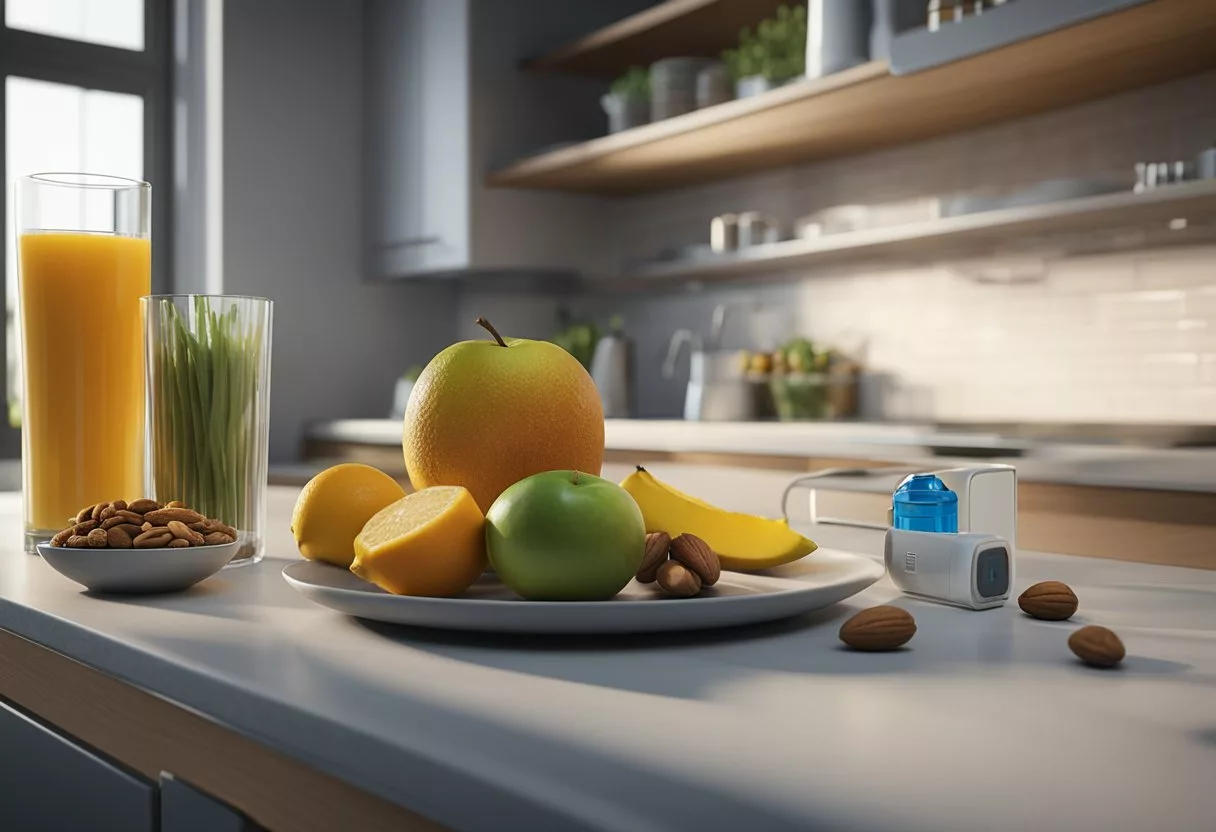
Choosing the right nighttime snacks is crucial for managing diabetes and ensuring a good night’s sleep. Certain snacks can influence sleep quality and may affect blood sugar levels, so it’s important to understand these dynamics before indulging in a pre-bedtime snack.
Influence of Snacking on Sleep Quality
Nighttime snacking can both positively and negatively affect one’s sleep. Snacks rich in magnesium may promote relaxation and improve sleep quality due to magnesium’s role in supporting sleep-regulating hormones like melatonin. However, foods that are high in sugar or fat may cause disruption in digestion, leading to poor sleep.
- Foods beneficial for sleep:
- Nuts (almonds, walnuts) – high in magnesium
- Cheese and crackers – balanced in protein and complex carbs
- Foods that may disrupt sleep:
- High-fat foods – difficult to digest
- Sugary snacks – can cause spikes in glucose levels
Pre-snack Blood Sugar Testing Guidelines
Testing blood sugar before snacking is essential for people with diabetes to prevent overnight hypoglycemia or hyperglycemia. The Somogyi effect, a rebound hyperglycemia that occurs in response to low blood sugar at night, should be considered when checking glucose levels. If blood sugar is low, a snack might be necessary, but the choice of snack should have a balanced nutrition profile to prevent a spike in blood sugar levels.
- Guidelines for testing:
- Test blood sugar to inform snack choice.
- If blood sugar is low, prioritize snacks that provide a steady release of glucose.
Professional Guidance and Personalized Nutrition
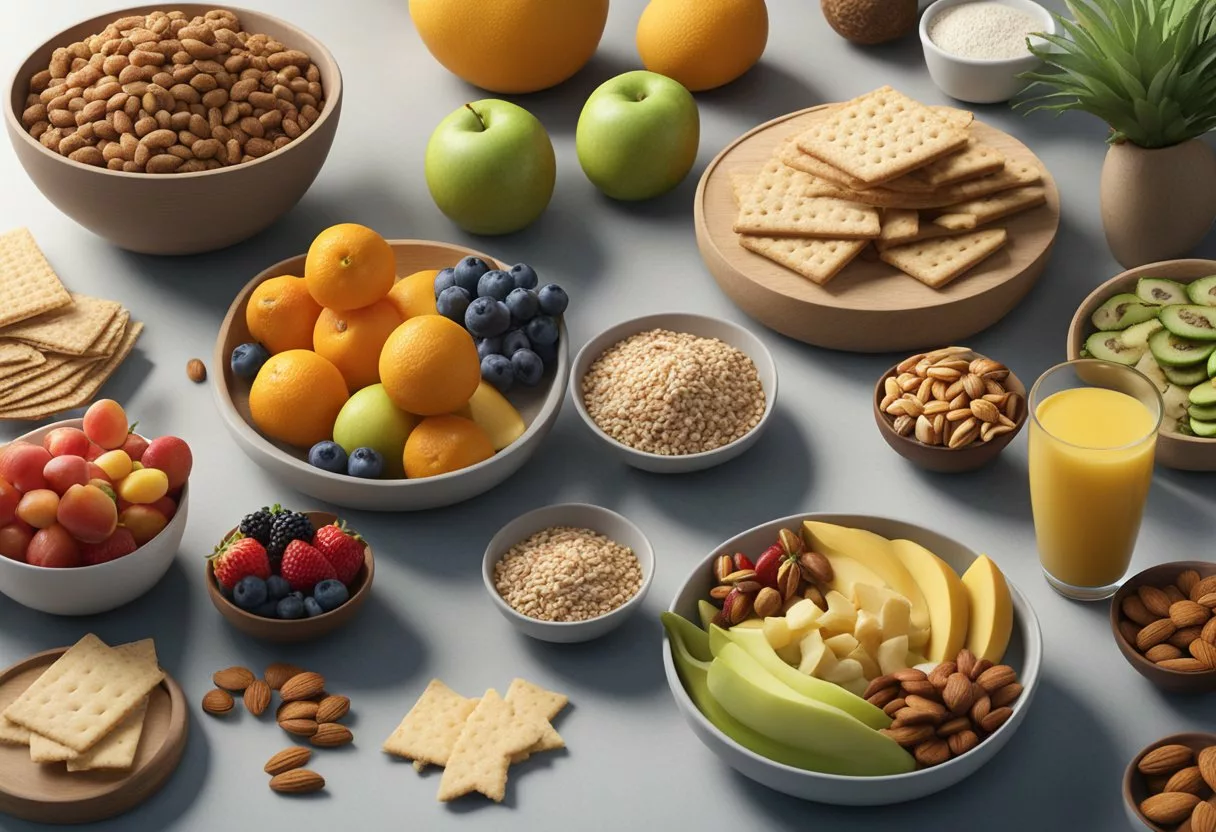
When managing diabetes, individualized dietary advice from a registered dietitian can be invaluable. They tailor recommendations considering one’s lifestyle, diabetes management goals, and overall health, including heart health and weight management. A balanced approach enhances insulin sensitivity, which is crucial for maintaining stable blood glucose levels.
A dietitian evaluates a patient’s nutritional needs and constructs a personalized snack plan, often pinpointing the balance of macronutrients to stabilize nighttime blood sugar. Below is a structured approach they may follow:
- Assessment: Reviewing dietary habits, medical history, and blood sugar patterns.
- Plan Creation:
- Carbohydrates: Selecting complex carbs with a low glycemic index.
- Protein: Incorporating lean protein to aid in satiety and blood sugar control.
- Fats: Emphasizing heart-healthy fats for overall well-being.
- Implementation: Teaching portion control and timing of meals.
- Monitoring and Adjusting: Regular follow-ups to refine the eating plan.
Sample Snack Ideas:
- Carbohydrates: Half a cup of cooked oatmeal
- Protein: A hard-boiled egg or a slice of turkey breast
- Fats: A tablespoon of natural peanut butter
Supplementary Tips for Managing Diabetes
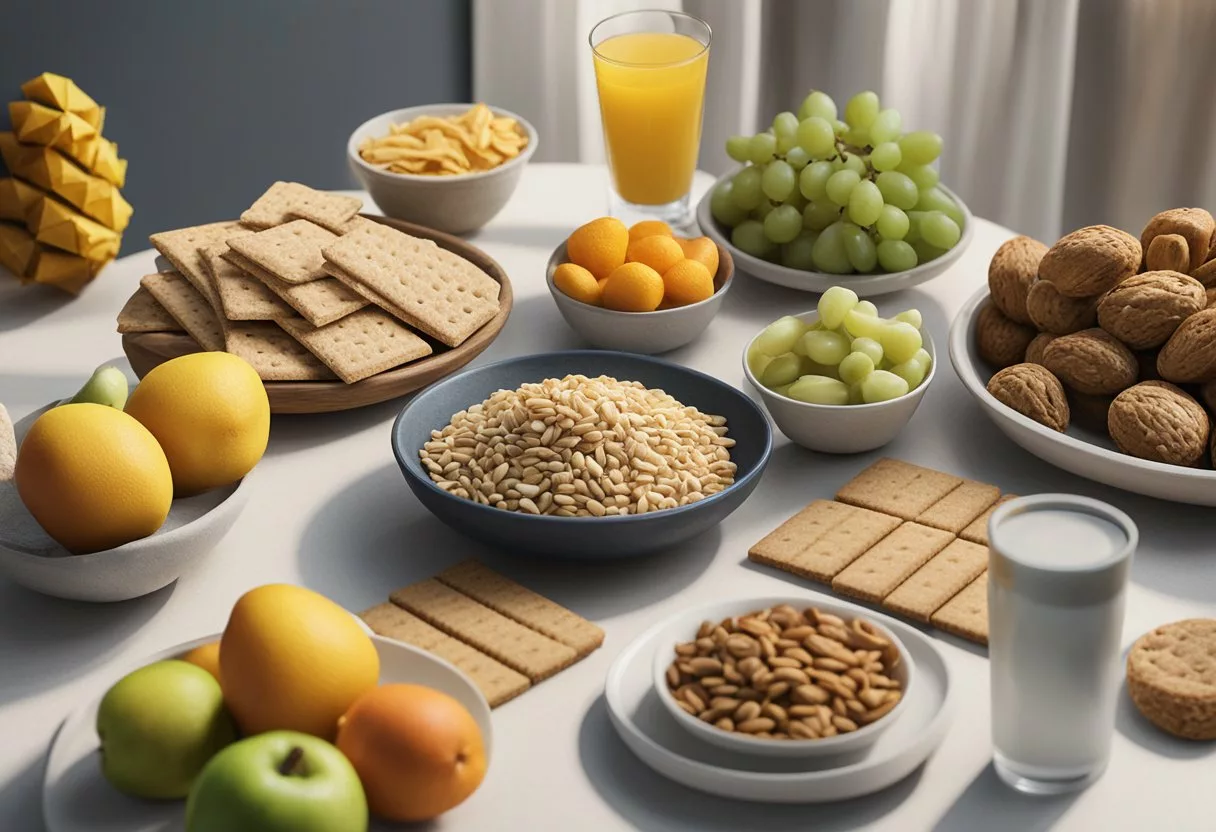
Managing diabetes extends beyond careful meal planning. Incorporating regular exercise and staying hydrated play pivotal roles in maintaining stable blood sugar levels and promoting overall health.
Incorporating Regular Exercise
Regular physical activity is key for individuals with diabetes. It helps control blood sugar levels and boosts insulin sensitivity.
A consistent exercise regimen can include various activities such as:
- Walking: A brisk 30-minute walk five times a week.
- Cycling: Riding a bicycle can help enhance cardiovascular health.
- Swimming: An excellent low-impact workout for the whole body.
Before starting any new exercise routine, it’s advised to consult with healthcare providers.
Hydration and Diabetes Control
Staying well-hydrated is essential for blood sugar control. It helps the kidneys flush out excess sugar through urine.
An adequate water intake should be maintained throughout the day, aiming for:
- At least 8-10 glasses of water daily.
- Replacing sugary drinks with water or other sugar-free beverages.
Proper hydration supports overall bodily functions and is a simple yet effective supplement to diabetes management strategies.
Conclusion

Selecting healthy snacks for individuals with diabetes involves a focus on nutrition and macronutrient balance. Snacks with a combination of proteins, healthy fats, and complex carbohydrates contribute to diabetes management by providing sustained energy and helping to maintain stable blood sugar levels.
Key elements for nighttime snacks include:
- Complex Carbohydrates: Provide a steady release of glucose.
- Proteins: Aid in overnight blood sugar stabilization.
- Healthy Fats: Contribute to satiety and have a minimal impact on post-snack glucose levels.
For optimal diabetes management, individuals should consider snacks such as:
- A handful of mixed nuts
- Greek yogurt with berries
- Apple slices with peanut butter
- A slice of whole-grain bread with avocado
It’s essential for individuals with diabetes to consult with a healthcare provider to tailor their snacking options. Tailoring to personal health needs ensures that their specific dietary requirements are met, thus effectively managing their condition.
Consistency in snacking habits and selection within individual nutritional needs are vital for successful long-term diabetes management.
Frequently Asked Questions
Selecting the right snacks can be key for maintaining blood sugar levels for those with diabetes, especially before bedtime. These frequently asked questions provide specific options to consider for nighttime snacking.
What are some diabetic-friendly snacks that could help lower blood sugar levels before bedtime?
Eggs are an excellent snack choice for diabetics, potentially aiding in the reduction of fasting blood sugar levels. Consuming them boiled makes for a convenient way to enjoy them as a snack.
Can you provide a list of snacks suitable for diabetics to consume at night?
Diabetics can enjoy a variety of snacks at night including Greek yogurt with berries, apple slices with peanut butter, and a handful of nuts such as almonds, walnuts, and peanuts.
How does oatmeal affect blood sugar levels when eaten as a nighttime snack by diabetics?
Oatmeal has a low glycemic index, meaning it’s digested more slowly and may prevent spikes in blood sugar levels. Eating it with a source of protein or healthy fat can further stabilize blood sugar overnight.
What are the best low-carbohydrate snack options for diabetics before sleeping?
Raw vegetables with hummus, cheese slices, and boiled eggs are excellent low-carbohydrate snacks that can be enjoyed by diabetics before sleeping without significantly impacting blood sugar levels.
Are high-protein snacks beneficial for diabetics to eat at bedtime, and what are some examples?
High-protein snacks, like a serving of cottage cheese or a turkey roll-up, can be beneficial for diabetics as they help keep blood sugar levels stable and contribute to satiety throughout the night.
What are appropriate snack options for managing fasting blood sugar levels in gestational diabetes during the night?
For those managing gestational diabetes, snacks such as unsweetened yogurt with nuts and seeds or a small piece of fruit with a handful of almonds can help maintain steady fasting blood sugar levels.
